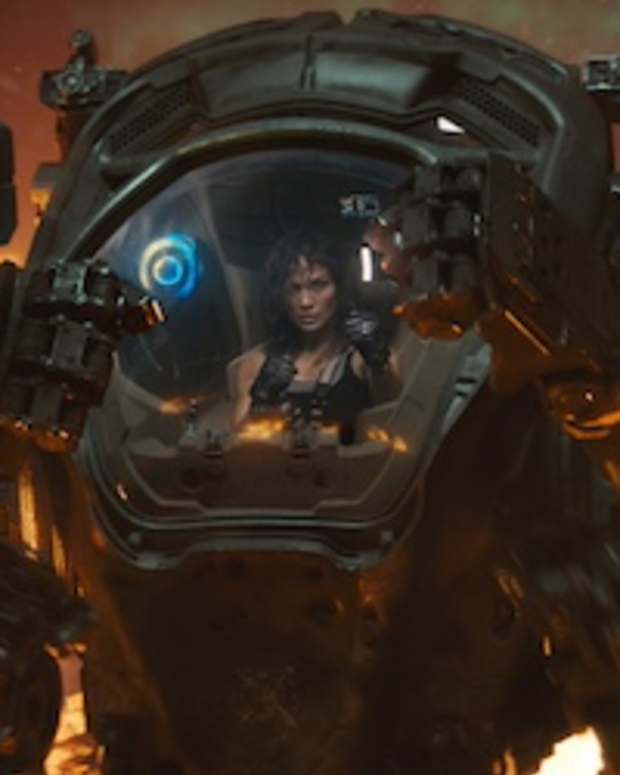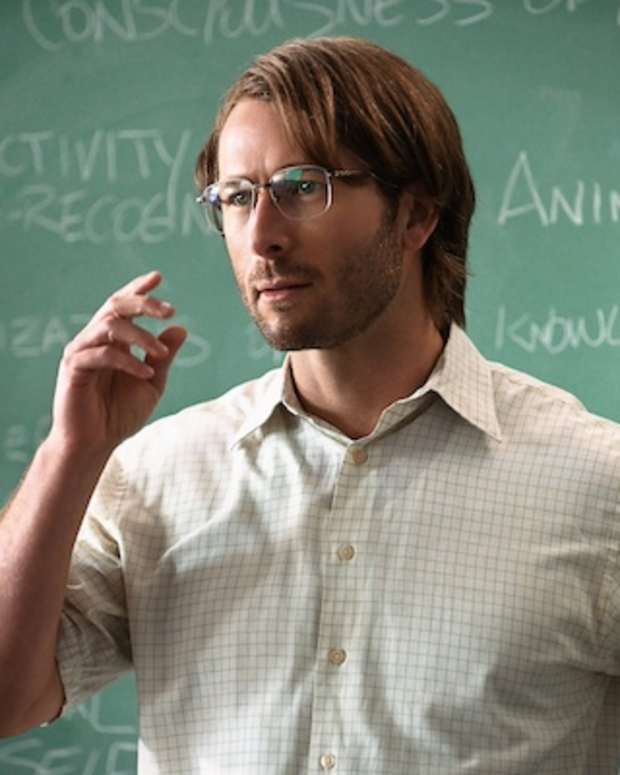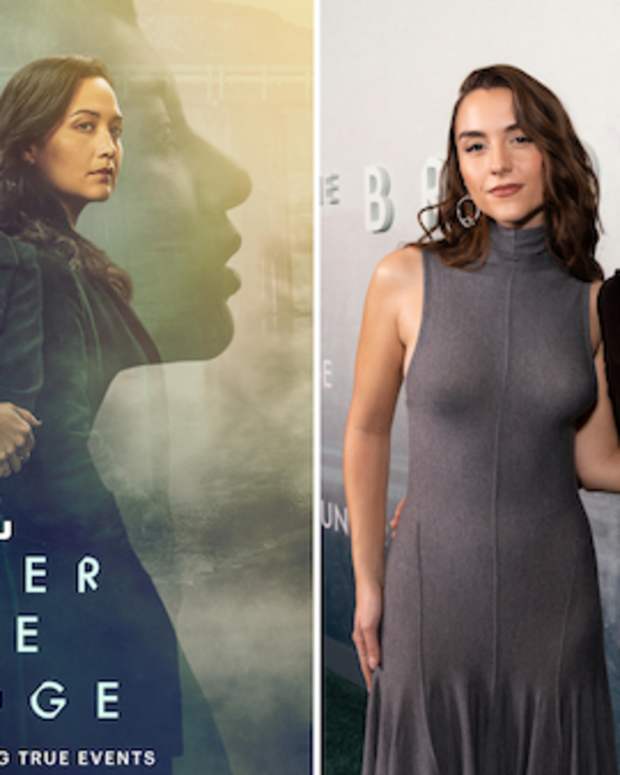Breaking & Entering: The Making of a Showrunner – From 'The West Wing' to 'The Irrational,' A Conversation with Mark Goffman
There is no clear path to a career in the film industry, so I find myself fascinated by people’s very different journeys. There is no one better to talk to about intriguing backstories than my friend Mark Goffman, who set out to pursue everything and anything that interested and excited him, excelling in an array of arenas, only to discover he had created a foundation of knowledge and experience that epitomized the ideal qualifications for his dream job.
Mark’s impressive career in the television industry has been rich in mentorship from some of the most iconic showrunners of all time. Mark brings an exceptional skillset, a unique background, and a breadth of perspective to his work. I’m excited about his latest endeavor, NBC's series The Irrational, which spins the familiar “whodunit” into a deeper, intriguing “whydunit.” The show examines human behavior through the lens of protagonist Alec Mercer, a behavioral science professor played by the captivating Jesse L. Martin. It offers authentic insights into the behavior of others, as well as our own, along with the delicious mystery of solving crimes.
Mark has worked on more than 200 hours of scripted television, been nominated for two Writers Guild Awards, and won the Entertainment Industries Council SET Award. An episode he wrote of Law & Order: SVU garnered Golden Globe and Emmy nominations for Mariska Hargitay.
Prior to being an executive producer and writer for The Irrational, Mark was an executive producer and writer on the Netflix series, The Umbrella Academy. He also executive produced and showrun Bull on CBS and Sleepy Hollow on Fox. Additionally, he served as an executive producer and writer for Limitless on CBS and USA’s White Collar.
He began his television career on NBC's The West Wing, where he wrote for several seasons. Afterward, Mark ran the writers' room for Aaron Sorkin's Studio 60 on the Sunset Strip, also on NBC.
I’m so pleased to have the opportunity to speak with Mark for Script.
This interview has been edited for content and clarity.
Barri Evins: Your background is truly one of a kind Mark. Not many people would imagine launching an impressive television writing career with degrees in economics, philosophy, and public policy, but for you, this seems to have been the perfect combination!
Mark Goffman: I didn’t realize it at the time; I was fortunate to get to pursue the things that I love doing and the subjects that excited me. After I graduated college, I got the opportunity to work in Brussels, Belgium. I lived there for a while, learned about the European community, and got a much more global perspective on life. That led to studying public policy at the Harvard Kennedy School. I always loved writing, and I think that’s what I like so much about getting to have a career in Hollywood. You get to combine all your interests.
Whatever excites you subject-wise, character-wise, write about it! Infuse those stories with real emotions from your experiences, and explore stores from different points of view.
Mark: For me, it was great that I had some limited working knowledge of government, international policy, and politics. I then got to bring those experiences to The West Wing. I always try to find stories and subjects that hit on some policy or social justice issue that has a larger impact on our culture and society.
Barri: I believe when you follow the things that you're excited about learning, it can lead you places. How did you become a political speechwriter?
Mark: I took a course in speechwriting and talked to people who had done that as a career. It seemed like a great way to have an impact and do something I really enjoyed. After I graduated, I got to work on political campaigns and do some ghostwriting and speechwriting.
Barri: At what point did you become interested in screenwriting?
Mark: I’ve always been interested in screenwriting, I just never knew it was something attainable by me. It took me a long time to put together that people actually wrote the shows and movies that I watched. My high school band teacher created a little TV studio out of a broom closet, and we got to make shows for the school that would play during lunch hour. It was a sitcom one day, a drama-crime-mystery, a game show, a news day, and then an experimental day. So we had programming five days a week. It quickly became my favorite class. It was the most fun thing I had ever done. I just didn't realize I could actually do it professionally.
Later, once I saw The West Wing, I was inspired. This was the 'wish fulfillment' version of what I was hoping the White House and the West Wing would be like, and the kinds of people and conversations you would have there. I sat down and wrote a spec episode based on my experiences. I was lucky enough that it wound its way to the show. I was called in for an interview and got hired on the show.
Barri: That’s an incredible story! At some point did you study screenwriting and TV writing?
Mark: I had that few years in high school where it was pure play. We didn't know what we were doing, we just wanted to make stuff that was fun, and that we enjoyed. I took some courses at Emory, but at the time they had only one production class. For my final project, I got a B-minus. I had worked really hard on it, and my friends seemed to enjoy it. So I went to the professor – a frustrated filmmaker – and asked him why I didn’t get a better grade and how I could improve. His only comment was, 'If you're going to work in entertainment, you better get used to disappointment,' and then he shut the door on me! In some ways, he was definitely right.
Barri: What was it like to land in The West Wing’s writers' room?
Mark: Once I got there I did everything I could to study scriptwriting and filmmaking. I read every book I could find. I was really lucky in that the staff was incredibly generous in helping train newer writers, showing us the ropes, as well as looking over our material, and giving feedback. Also, working for Aaron Sorkin, I was not very versed in playwriting or in musical theatre. So I tried to read and see as much musical theatre as I could to understand the language, because it was very important and referenced a lot in the room.
Barri: I can see that understanding that vocabulary would be essential.
Mark: I had played in a band in high school. I'd written lyrics for songs, and I really enjoyed playing music, but it was completely different to dive into the world of musical theatre. There’s a rhythm and a cadence and a lyricism to dialogue that is just magic when it works.
Barri: Do you have any pointers on making the most of this first opportunity?
I think it’s incredibly important to figure out where you can add value.
Mark: On The West Wing, any time we were doing an international story, a military story, a peace negotiation, I would reach out to people I knew who had real-world experience, and bring as much information as I could to the room that would add value, something they wouldn't typically know. I always tried to bring new insights. It's: 'Tell me something I don't know. Tell me something I haven't heard yet.' I encourage that mindset from the writing staff I work with, and I certainly tried to do that when I was starting out. Bringing counterintuitive, non-obvious, sometimes contrarian ideas, so you can build solid motivations and have characters who surprise you. Come in with stories that don’t feel familiar but also are based in authenticity.
With The West Wing, and the episode “Shutdown” that I wrote, I was fascinated by the government shutdown between President Clinton and Newt Gingrich, who was then Speaker of the House. In the 1990s, it was one of the longest and most intense of the time, and it was all about brinkmanship. The ways that it shifted in public favor, the ebb and flow of the policy issues that gained momentum in the media, was fascinating. That was an example of a story that I brought to the room, something that the show hadn't yet covered.
Barri: I'm going to unabashedly admit that I’m a huge fan of The West Wing, and of that episode in particular. Unfortunately, it's still terribly timely. I think cinematically, it is a brilliant episode.
Mark: I had also researched a shutdown during Ronald Reagan’s first term that didn’t last nearly as long. Very early in the conflict, Reagan decided he was going to go to Congress to show his willingness to make a deal, which is incredibly rare for a president to do. As his motorcade was driving down Pennsylvania Avenue, he said, 'You know what, I'm going to walk the rest of the way.' And he got out, greeted the throngs of people, and created a media frenzy. That moment was so brilliant, I thought, 'I have to try to work that into the episode.' So that was initially my pitch.

[L-R] Martin Sheen as President Jed Bartlet and Bradley Whitford as Josh Lyman in The West Wing, Season 5, Episode 8 "Shutdown." Courtesy of NBC.
The West Wing was shot on the Warner Bros lot, and we only took one or two trips to Washington D.C. each year for location shoots. I pitched that episode and that scene, but I had only a vague shape for the episode. It got approved, but we were going to Washington in two weeks, and if I didn’t get the scene into that trip, we wouldn't be able to easily recreate it here in LA. I thought it was critical. It was the climactic turning point of the episode. So I wrote that scene before I had written the rest of the script. I was just praying that it was going to work and that I would be able to properly tee up that moment because I wrote it before I even had my full outline. Thanks to John Wells, who was showrunning at that time, and had the faith that it would work out, they shot that scene. The rest of the episode was shot two or three months later.
Barri: You must have impressed a lot of people in the writers' room to get a “story by” credit in your first season. You’ve worked with a bevy of very talented and distinctive showrunners: Aaron Sorkin, John Wells, Dick Wolf, and Robert Doherty. These are all landmark guys. Were there things you took away from these showrunners that prepared you to become a showrunner?
Mark: I was incredibly fortunate that when I started on The West Wing, first Aaron Sorkin was the showrunner, and later John Wells took over. Two very different styles, but I learned so much from both of them. Both were amazing mentors, incredible people, whom I still reach out to for advice. John Wells starts with the premise that he’s hiring a writer for their particular voice, and he wants to hear it. He wants you to tell a story within the framework of the show, but he truly wants you to put yourself in it. That's a real gift. John treats everyone on staff as if he is training them to one day become a showrunner.
As story editors, we were involved in casting, post-production, sitting in the edit bay, going to the set, working with the directors. He gave you the room to learn those skills so you understood how you're going to need to one day communicate with wardrobe, set designers, hair and makeup artists.
In The Irrational, we have a lead character who is in makeup with a scar on his face in every episode. What does that do to your schedule, because it means that close to an hour a day he’s putting on a scar? How does that impact production? And how does it impact how that actor may feel sitting in makeup for an hour every day? There are all these things to think about, communicating with hundreds of people, setting locations and budgeting, which is all part of showrunning.

[L-R] Wonser De-Gbon as Tara Moore, Jerod Haynes as Keith Moore, Jesse L. Martin as Alec Mercer, Season 1, Episode 4, "Zero Sum," The Irrational. Courtesy of NBC.
Mark: You always start with what's on the page, but the final cut is a compilation of every artist who works on the series. The incredible team you put together – how do you inspire them and get the best work out of all the creative talent on the show? John really emphasized that. Aaron was my first boss and mentor. It was such a gift to get to work closely with him. I talked before about his approach to dialogue and language, and the musicality of it. Aaron also talks about the most fundamental elements of what makes a scene. Going back to Aristotle’s Poetics. Intention. Obstacle. What does a character want? What is preventing the character from getting it? These are things I still think about. And have gone back to watch his MasterClass, which I highly recommend!
I think about how every moment and every word is important. There are no filler scenes, no scene just to get you to another scene. Whatever you're showing an audience should be the most interesting, compelling, and impactful moment that they could be watching right now. Otherwise, why are they watching?
Mark: Thinking about characters, and having them all be intelligent and thoughtful and passionate about what they're doing, and about the nobility of a profession. I was lucky throughout my career to work with people I admire and continually learn from. Steve Blackman on The Umbrella Academy is just a genius and a good friend. Every day on that project was a blast.
Barri: You’ve worked in a range of genres and tones. The comedy-drama of Studio 60 on the Sunset Strip, the fantasy adventure of Sleepy Hollow, The Umbrella Academy, a fantasy superhero adventure based on a comic, and now The Irrational. I've really been enjoying watching it, as it offers something fresh in a familiar genre, breaking the mold of procedurals in numerous ways. I'm fascinated to see what the hero’s long-term character arc is going to be. We don’t often get that depth of character arc on network series.
Mark: Since I grew up in broadcast television, I have so much reverence for it, and the ability to tell as many as 22 episodes in a season (or more). I was lucky to work with so many great people who were incredible at that, including Rob Doherty in Elementary. The approach to The Irrational was, 'What can we bring to this genre?' We're able to tell stories that explore all kinds of inexplicable human behavior – that’s the core of the premise. It seems to be in the zeitgeist. 'How can someone come to believe something so radically different than I do? How do they think they know the facts that many other people are certain are false?' It reminded me of the Mark Twain quote, 'It ain’t what you don’t know that gets you into trouble. It’s what you know for sure that just ain’t so.' We come to believe things that are highly biased by what we want to believe, and that can drive behavior that seems inexplicable to those outside of our bubble.
I had known Dan Ariely and reread his book, Predictably Irrational, The Hidden Forces That Shape Our Decisions. He is a pioneer in the field. He was also burned over 70% of his body early in life. And having been in the hospital for three years gave him the time and space to come up with a lot of the theories that ultimately became the basis of his books.
Breaking & Entering: Writing Is Decision Making! Here's How to Make Great Decisions
Using that as inspiration, with Sam Baum, who is a phenomenal partner and collaborator, and Arika Lisanne Mittman, who is a fantastic creator and showrunner, she put all these ideas into the character, Alec Mercer. We could not have gotten a better casting than Jesse L. Martin. He makes this professor accessible and relatable. You want to watch him; you want to hear his often counterintuitive ideas and ways of looking at the world. He is endlessly curious. He's often contrarian in his ideas, but they are well-founded. We get to follow his point of view and thought process of solving these mysteries each week, putting himself in harm’s way well, because in some ways, the worst has already happened to him.
Barri: I'm the girl who double majored in theater and psychology, which baffled people, but I just was pursuing things that fascinated me. So the character of a behavioral scientist is very much in my sweet spot. He's an intriguing, troubled, and brilliant protagonist.
Mark: Thanks. I think there is really a commonality between acting, writing, and psychology. We are all trying to understand human behavior. Why do people do the things they do? Can we understand each other better? One of the things I love about writing is getting to explore different points of view. Characters often have opposing worldviews, and certainly react very differently than I would to an event. To write about it authentically, you’ve got to find what drives that character. Hopefully, that creates empathy.
Barri: What kinds of stories, characters, and conflicts are you drawn to?
Mark: For me, it usually starts with character. I love underdog stories. I love stories about outcasts and outsiders who ultimately have an outsized impact on both their world, and sometimes the greater world, often much to their own surprise. I like people who try to break through the limits of what they think they are capable of doing. I like eccentric characters. I also feel it's incredibly important to find the humor. It's not always laugh out loud, but there's comedy, and there's a sense of irony. Whenever I feel that in a story it makes me smile.
On Umbrella Academy, the fact that these seven siblings had superpowers that they didn't understand, didn't really want, and they couldn't get out of their own way – I thought that was hysterical, and loved writing the stories that spring from that. If I can work in some kind of social justice story that doesn't feel self-important – if it ever feels like you're trying to make it important then it doesn't work – that's really fun to write.
There’s a movie I'm currently working on about the founding of Bitcoin. What I love is that it’s a mystery. No one knows who the creator of Bitcoin is. And that person is literally sitting on some $30 billion dollars that has never been touched since he disappeared more than ten years ago. I’m incredibly excited that I will get to write and direct this film.
Barri: You beat me to the punch on the question of your interest in directing! I remember the screening at your home of Dumbstruck, the charming feature documentary you directed about ventriloquists.
Mark: I got to do that film with my wife, Lindsay Goffman, producing, and it was a really fun experience. We were very fortunate to get a theatrical release. The Satoshi Claim is being produced by David O. Sacks (Thank You For Smoking, Daliland) and Grey Matter Productions (The Laundromat, Pain Hustlers).
Meet Gratitude Productions Founder and Executive Producer Lindsay Goffman
Barri: That’s great, I’m really happy for you!
Mark: Thanks.
Barri: You’ve worked extensively for networks, for cable, and for streamers, a dichotomy that has come into focus with the recent WGA strike. What differences have you experienced?
Mark: Certainly the number of episodes and the period of time in which you’re doing them. Traditionally, on a broadcast show, you have about eight weeks before you start production. So the writers' room is going while you’re crewing up, building sets, booking directors, working to get everything prepped. Then production starts, so now your time is divided between the set and the writers' room. Then very quickly post-production starts, which is a third full-time job. All three are happening simultaneously. It's an intense, intense experience.
Breaking & Entering: Sensational Storytelling – We Want to Feel It!
At the end of the season, you get one or two months off, and then you’re back at it again. In streaming most of the episodes are written prior to starting production. The post-production schedule is also more spread out. It may take a year and a half to complete an episode, and you have time to devote to each of those three jobs. But on the downside – at least prior to the strike – often it’s just the showrunner, or the showrunner and one writer, who are in production for those eight to ten episodes, without the opportunity for many writers to gain the experience they will need in how shows are constructed and executed for when they have their own shows. I feel we lost that in a lot of streaming, but hopefully some of that will now be corrected.
Barri: Do you think the new WGA contract will result in more opportunities for young writers?
Mark: I hope so. It’s no secret that we’re in for a contraction. I’m concerned for those in the middle, writers who have some experience, and are more expensive than beginning writers, but not yet entrusted with upper-level positions. They often get squeezed out of staffing. That's a real lost opportunity because there are a lot of talented people in that category. Right now there's a lot of belt tightening, so I also hope we're still able to create among the many voices and genres that have been developing, and that the machinery doesn’t revert to traditionally safe and rehashed choices when buying and green-lighting.

Visit The Writers Store to learn more!
Barri: Many aspiring writers hope to break into television on the strength of an idea, by writing a bible and pilot, and increasingly with pitch decks. Do you think it’s realistic to break in this way, without prior experience?
Mark: Gone are the days of writing specs and getting into a writers' room, but there's a lot more opportunity now to break in with a pilot and an original idea. Any way someone can break through the clutter, whether creating a short, a web series, or a sketch comedy piece. And now is a great opportunity for filmmakers to create stunning visuals using tools that are available at a fraction of what they were even a couple of years ago. Have your own blog, have your own channel. If you have a compelling point of view, and you get it out there, create your own following, Hollywood tends to respond.
Barri: Thanks so much for making the time for this interview Mark!
The Irrational premiered on September 25, 2023. Watch Monday nights at 10pm Eastern/9pm Central on NBC. Catch up on episodes on Peacock.











![[L-R] Omar J. Doresy and Sebastian Maniscalco in Bookie (2023).](https://scriptmag.com/.image/ar_8:10%2Cc_fill%2Ccs_srgb%2Cfl_progressive%2Cg_faces:center%2Cq_auto:good%2Cw_620/MjA2NjY1MDM3NzA2Njk5OTgw/omar-j-john-johnsonmax.jpg)



